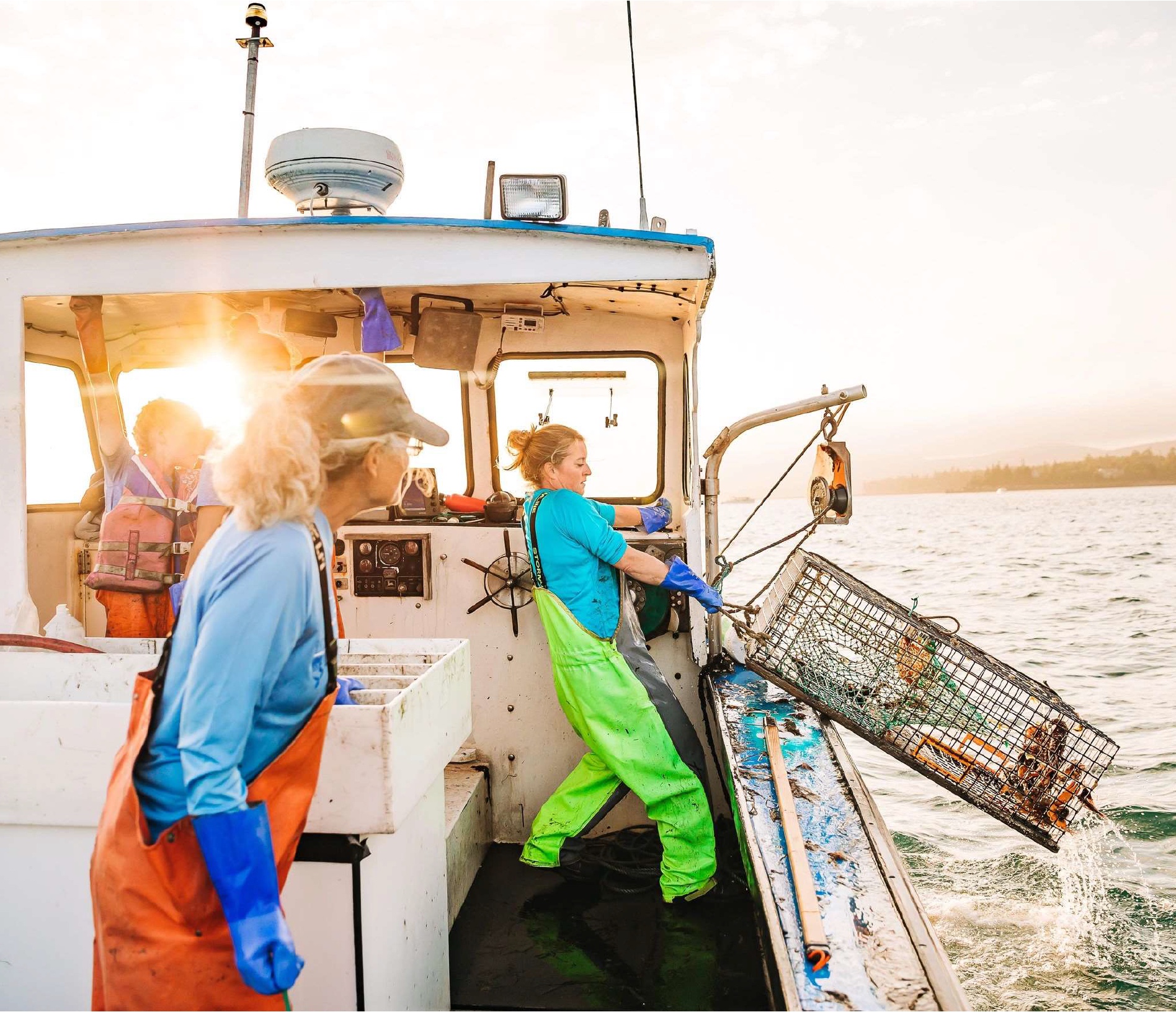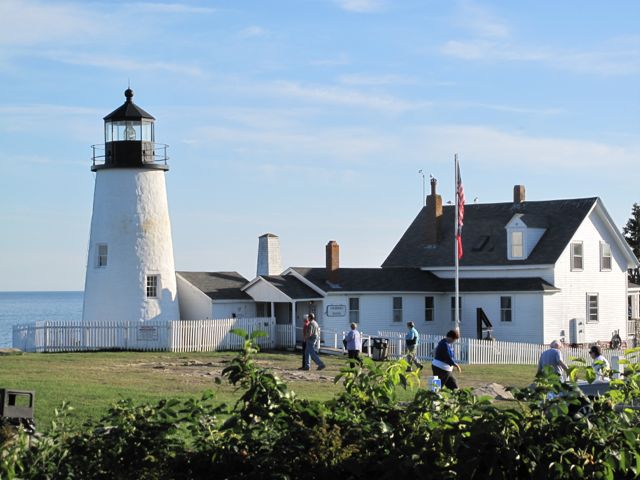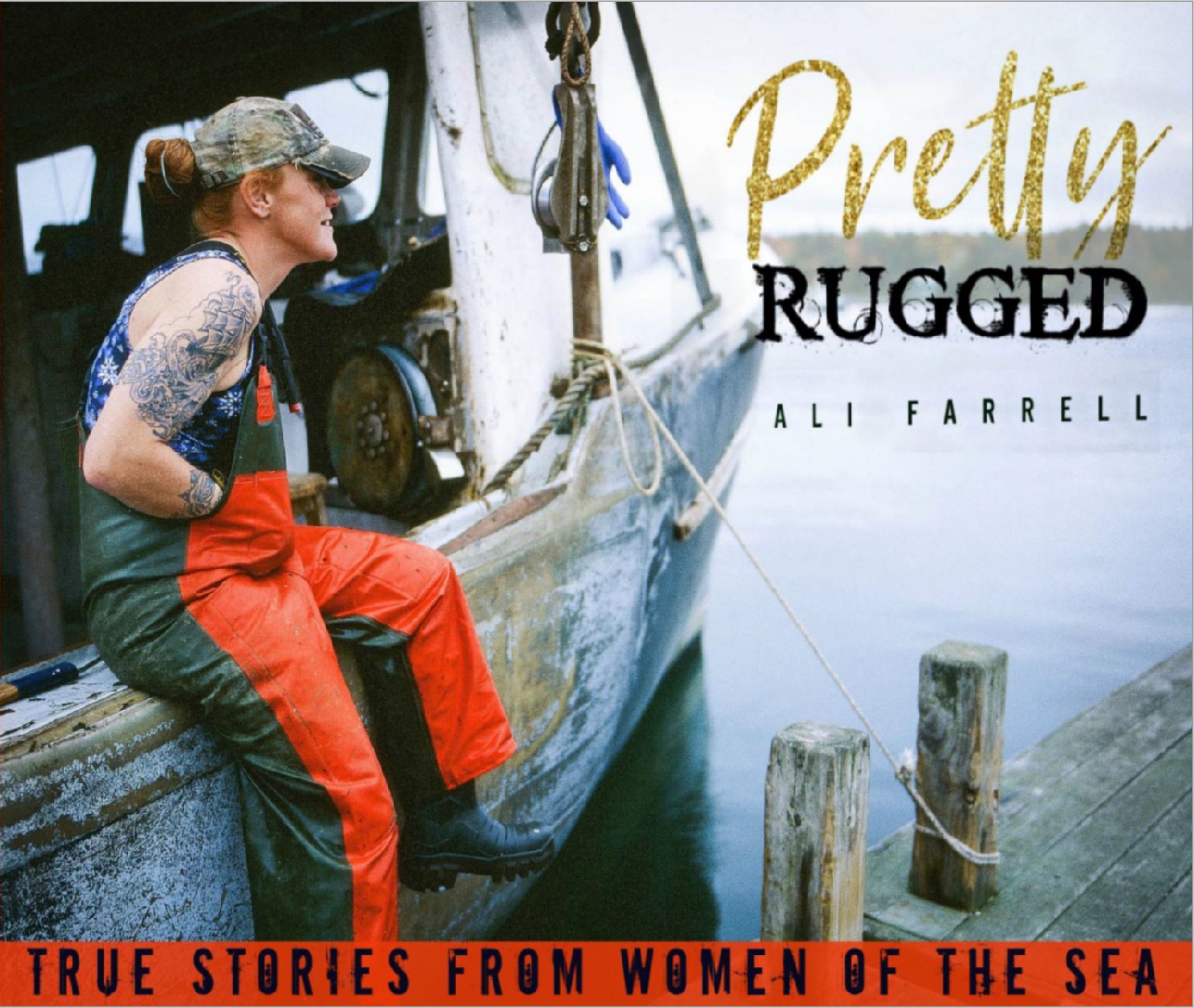
Mid-coast Maine resident Ali Farrell’s newest book, Pretty Rugged: True Stories from Women of the Sea, brings to life the heritage, lifestyles, backgrounds, and challenges of Maine’s female lobstermen. Farrell, a single parent of a 5-year-old boy and a 7-year-old girl, authored two other books and works as a professional photographer. She also donates time to United Fishermen Foundation, which supports fishermen and their families through education and advocacy.
Farrell lets the women featured in this 94-page, illustrated, hardcover book tell their own stories. The text shares their stories, but the photos bring them to life. Pretty Rugged is a fascinating porthole into the world of Maine’s female lobstermen. Many were introduced to the industries as infants; one has fished for nearly a century. The book’s title understates the grit, passion, and determination of these remarkable women.
Although I had planned to interview Farrell by phone, we switched to email to accommodate her two kids being sick and needing her attention.
What spiked your interest in sharing the stories of Maine’s female lobstermen?
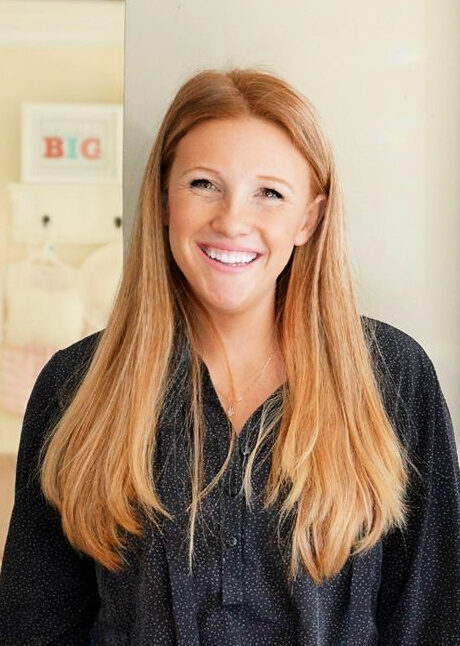
When I was young, my father fished offshore and my mother produced and sold lobster tanks, so I’ve always felt a connection to the industry. My father had all kinds of stories from fishing off of Newfoundland, and after talking shop with my female fishermen buddies, I decided they deserved to tell their stories to the world. It is a very uncommon and unique lifestyle to learn about, especially for those who are from away.
How did you approach researching this book?
I started out by interviewing my friends in the industry. They would send me women who heard and wanted to be a part of it. I enlisted the help of the All Things Lobstering group on facebook, where people tagged females in the industry so I could reach out to them.
The process gave me some really awesome days out on the water. I got to go out on the boat with a lot of the women to photograph and interview them. A workday, for me, doesn’t get much better than being on the water with them, not having to do any of the hard work that they’re doing, hearing funny stories and inappropriate jokes, and when the work is finally done, cracking a beer for the steam back to the wharf.
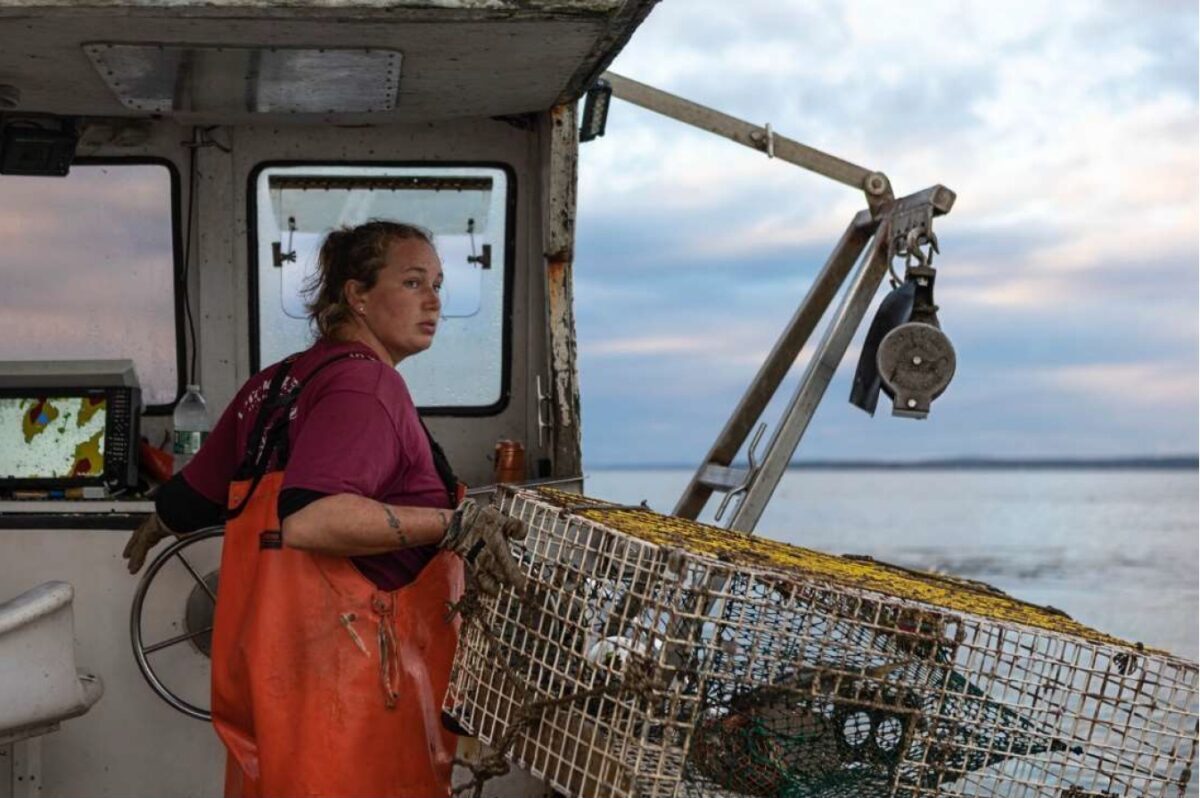
But I loved learning about who these women are beyond a fisherman. They are smart, driven and always searching to expand and upgrade their businesses. They are attorneys, state officials, they are diversifying their business in new ways and totally re-vamping the Maine fishing industry.
How did you select the women to feature?
I interviewed everyone who got back to me with the proper paperwork, which was 25 women. I used all of them aside from one, only because she is no longer fishing. But each and every one had interesting stories and backgrounds.
How long did this project take you
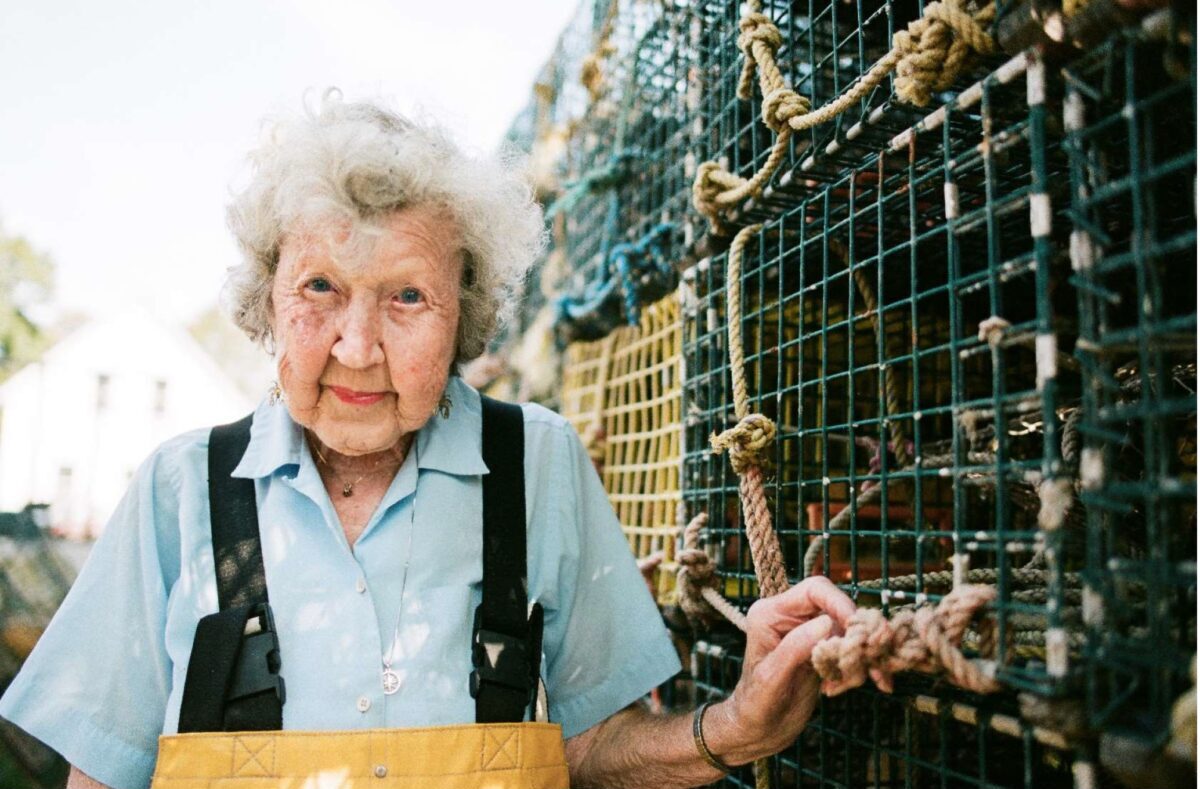
Pretty Rugged took me about 2 years from the beginning to the publish date of 12/15/20. Covid put a real strain on this project. The book was set to be released Spring 2020, but when the first quarantine began, the seafood market completely shut down. It didn’t make sense for the fishermen to have their boats/traps in with no outlet for the seafood. We were able to make a significant impact with United Fishermen Foundation during that time, as we connected fishermen directly with consumers, so they had an outlet for their catch.
But, for the book, I couldn’t get out to take photos if they weren’t fishing! Once things did open back up, I still couldn’t connect with a few of the people in the book who were high risk. For example, Virginia Oliver who is 100 years old and still fishing. But they were people I admired and made an impact, so it was worth it for me to wait and document them properly.
Which stories surprised you?
I loved reading about the costs included in running a lobster boat and business. So many people think lobstermen are scam artists, hiking up the prices simply because they’re greedy I enjoyed going over Captain Heather Strout’s yearly costs, although the numbers could make anyone cringe.
“Fishing gear has come a long way in terms of ease of procedure, but in order to assume these luxuries, it costs a pretty penny. The modern traps run about $150 per trap. Multiply that by the eight hundred traps a seasoned fisherman is typically allowed in Maine, and that adds up quickly. The cost of traps doesn’t even scratch the surface when it comes to expenses in this business.” (See photo, below)
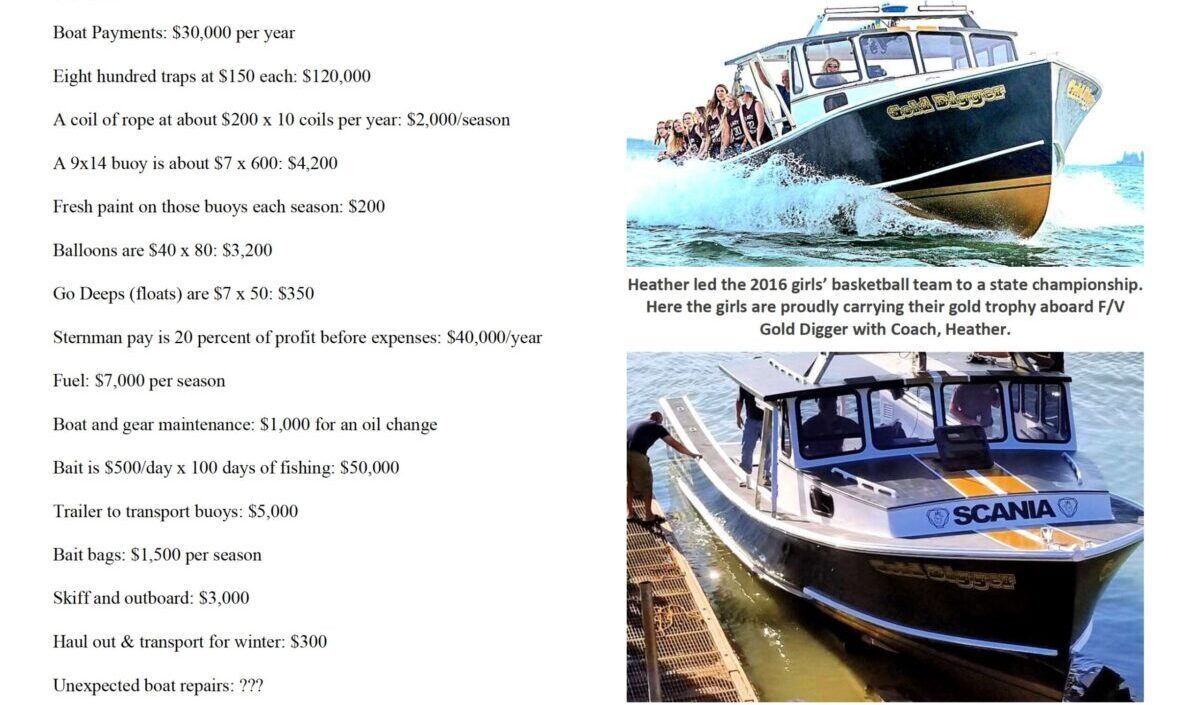 If you’re hauling eight hundred, a new boat could run you anywhere from $250,000 to $600,000. Heather has a 2017 36’ Wayne Beal with a tag of $250,000. Frank, Heather’s husband has a 2016 46’ Wayne Beal costing about $450,000. Heather’s oldest son, Spencer, custom designed a 44’ Calvin in 2018 and has about $600,000 into it. Other expenses creep up as well, and Heather also notes that her son’s offshore expenses are much higher, but you’re looking at about $267,750 in basic expenses as of 2020. So before you huff and puff about the price of lobster this summer, remember this list!”
If you’re hauling eight hundred, a new boat could run you anywhere from $250,000 to $600,000. Heather has a 2017 36’ Wayne Beal with a tag of $250,000. Frank, Heather’s husband has a 2016 46’ Wayne Beal costing about $450,000. Heather’s oldest son, Spencer, custom designed a 44’ Calvin in 2018 and has about $600,000 into it. Other expenses creep up as well, and Heather also notes that her son’s offshore expenses are much higher, but you’re looking at about $267,750 in basic expenses as of 2020. So before you huff and puff about the price of lobster this summer, remember this list!”
Which stories are your favorites?
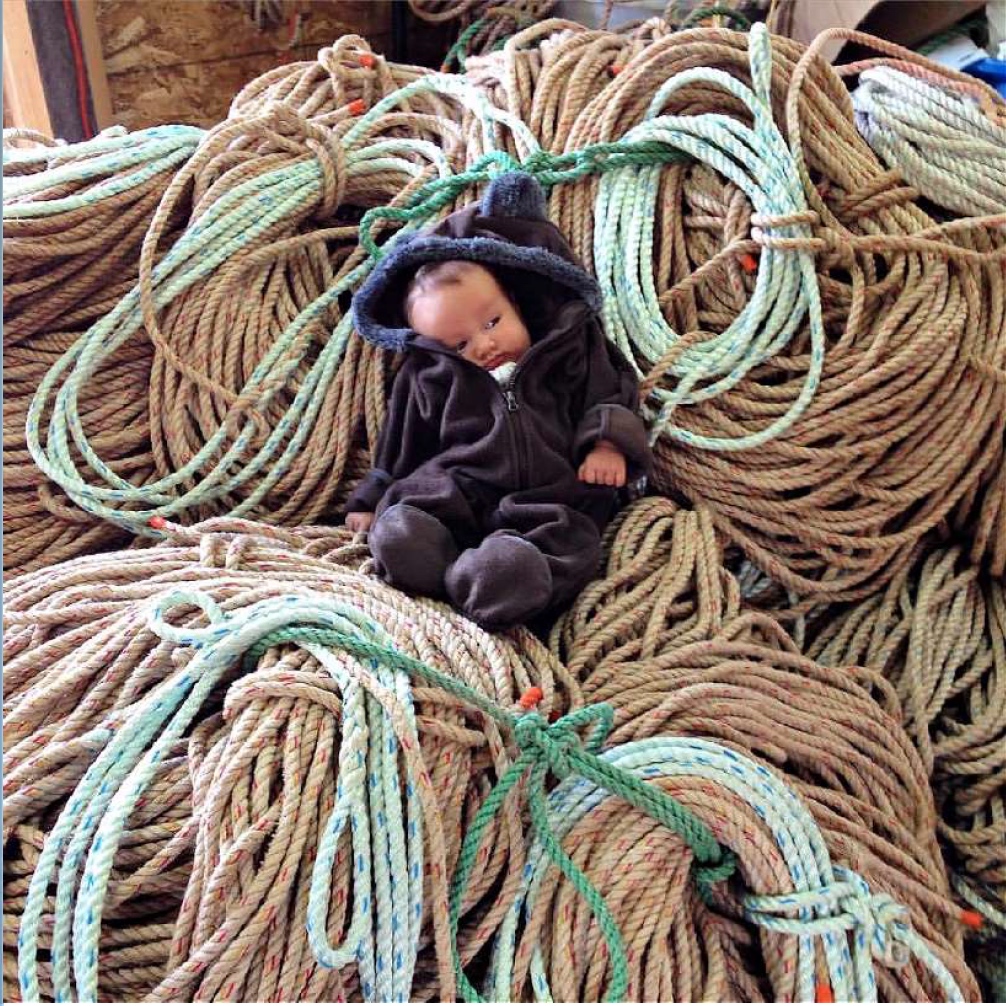
I love hearing about their childhood within a fishing family. So many of them had similar “daddy daycare” situations where they stayed in a playpen on the boat, napped through the hauls, and watched in amazement with every trap hauled to see what treasures would come up.
Once they were old enough to get to work, they all started immediately working the family business. They didn’t have a summer like most kids their age, as they worked hard, day in and day out, while the weather was good.
Do any female lobstermen you interviewed build their own boats or race them?
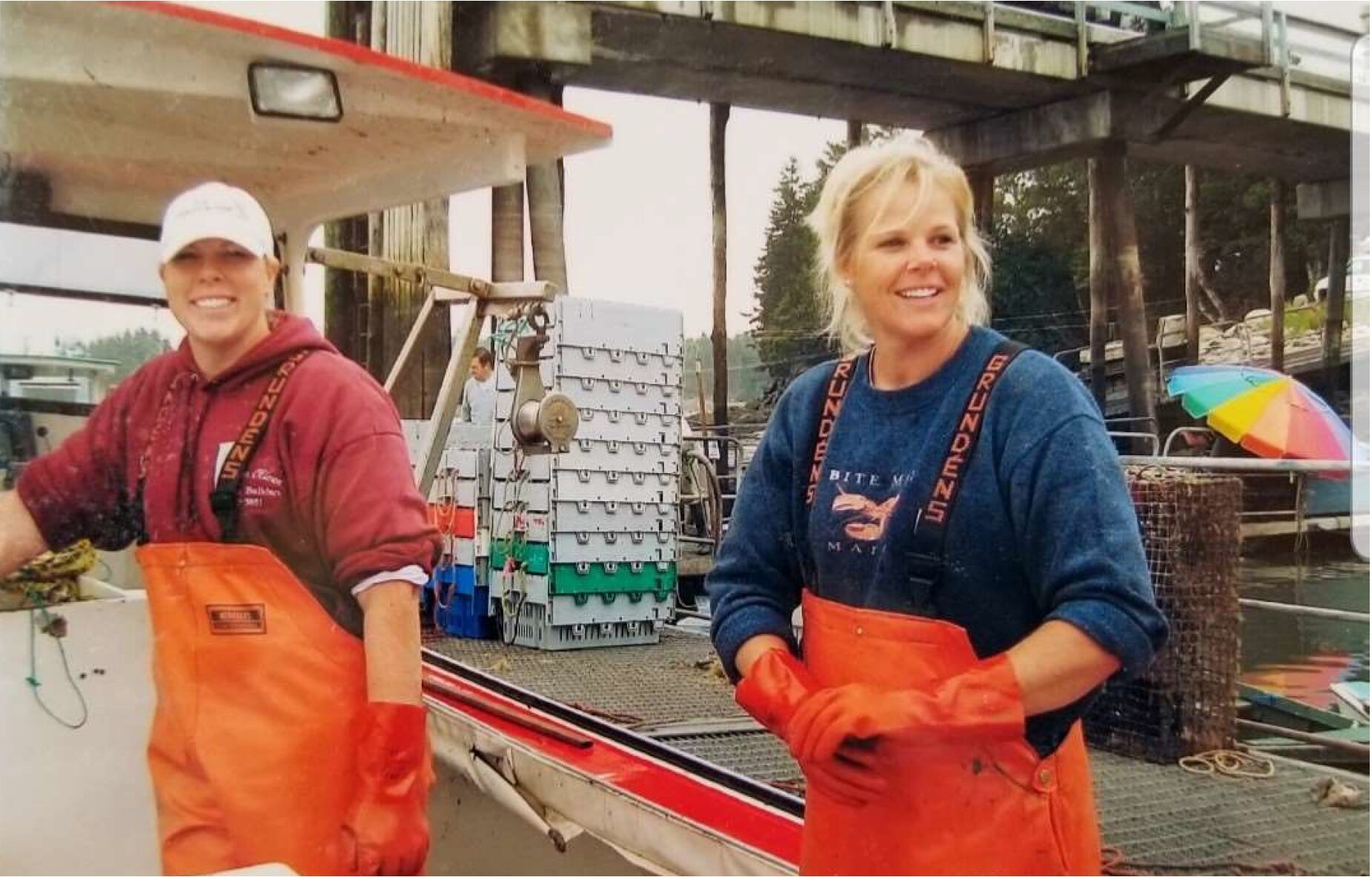
Heather Thompson is a lobster boat racing legend these days. She built her own beautiful boat and captains it with pride. Many of the people in the book have boats that have been in their family for generations. Some stripped the boats down the bare bones and rebuilt partially. One sure thing is, every single boat has a unique story behind it.
Many of the stories shared address contemporary problems Maine’s fishermen face. What do you hope readers learn from this?
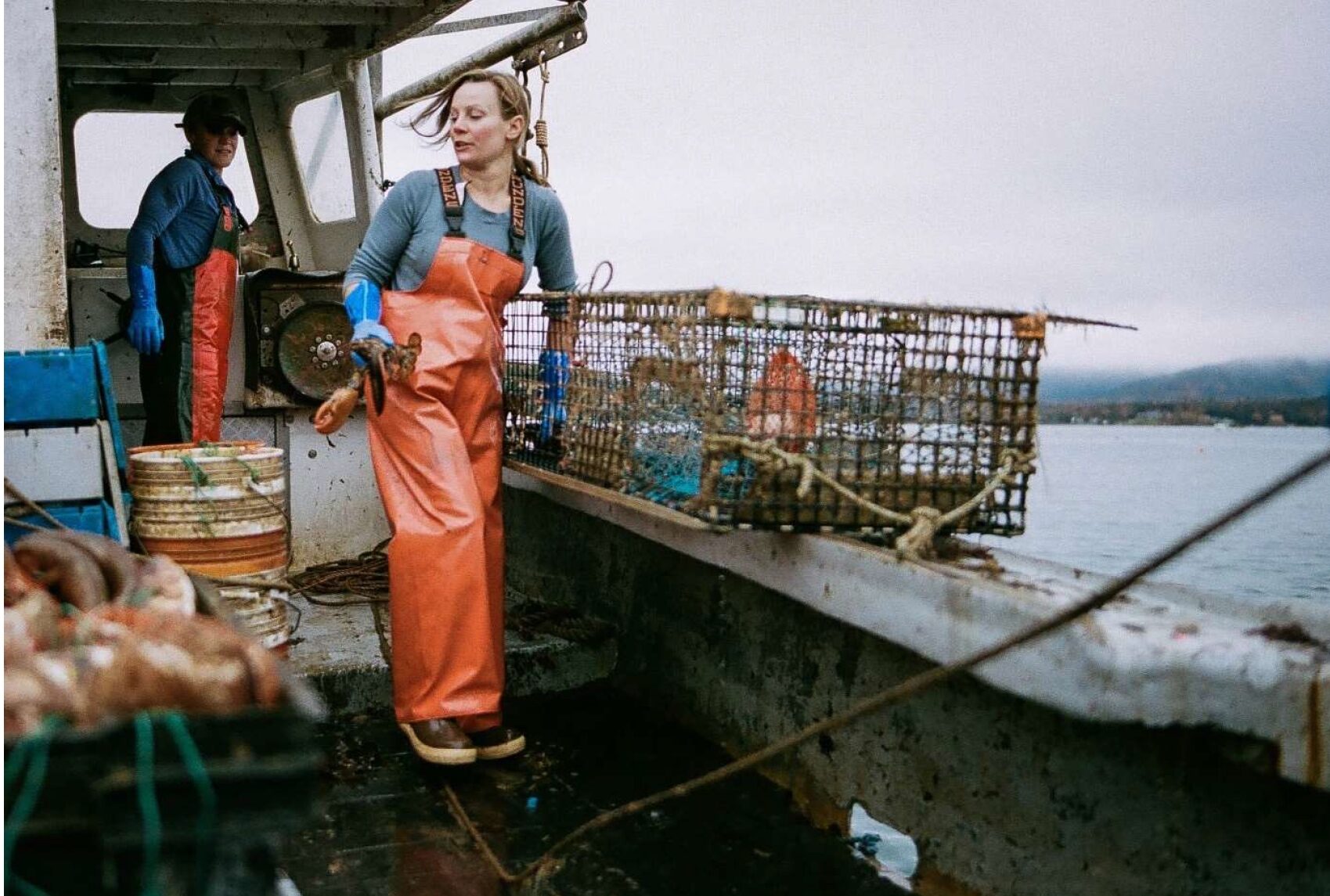
The fishing industry is an unknown for most people who are not closely connected to it by family or career. There is a lot going on with the fishing industry now, and we could really use some help from our communities in terms of advocating for the local fishermen. For instance, animal rights activists are trying to shut down lobstering for good, and we are rapidly losing our working waterfront, which is being replaced by hotels and tourist attractions, among other topics. If anyone is looking to get involved, I’d love to chat with them at Ali@UnitedFishermenFoundation.com!
You cover a lot of tragedies and near tragedies. Talk about the dangers of fishing.
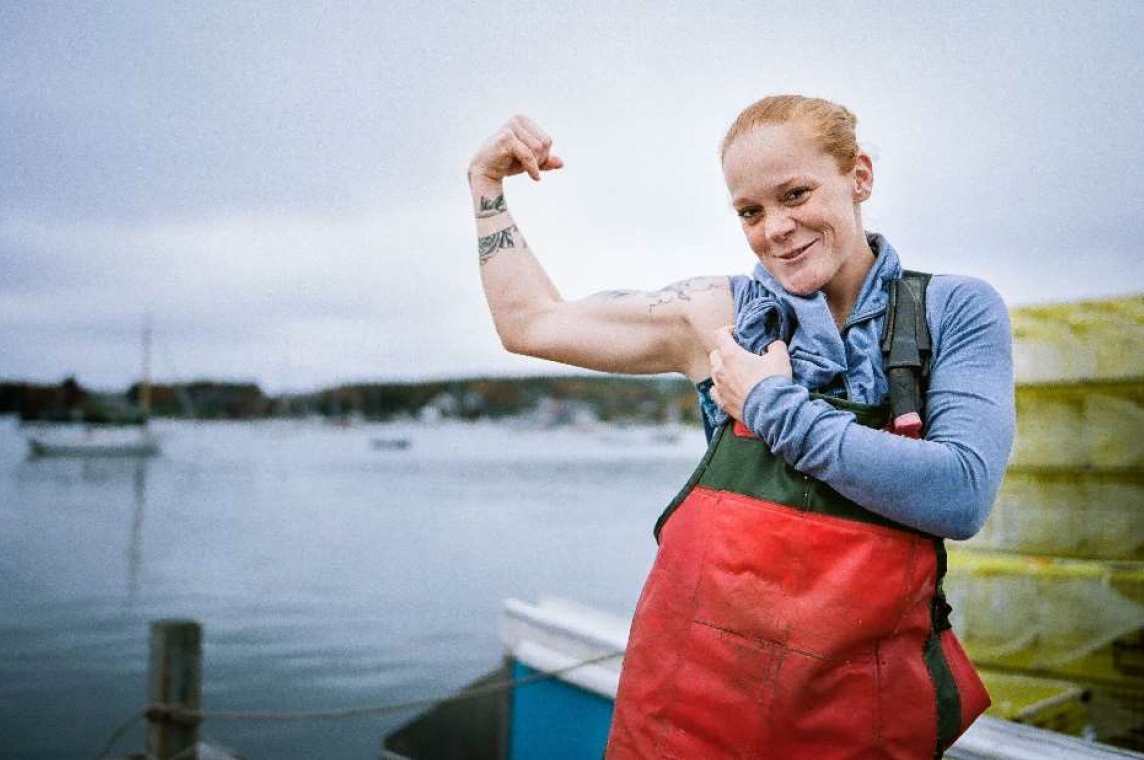
Commercial fishing is one of the most dangerous jobs in the United States. The fatality rate is 23 times higher than the U.S. average. Sinking vessels and falling from a fishing vessel are the top two causes of fatality.
Yet another danger lies in Maine’s unique coastline, loaded with jagged, rocky ledges scattered throughout the waters. The great state of Maine has 5,000 miles of coast if you include all the 3,166 offshore islands. About two-thirds of those islands are an acre or less, which leaves a lot of land lying right below the waterline at high tide. As you can imagine, with all these obstacles combined with mother nature’s grasp on the conditions, even the most seasoned captain can run aground, especially if cruising around outside of their normal fishing areas.
Within the normal day-to-day routines on the boat, injuries are quite common. Between weather, gear malfunctioning, gear shifting in rough conditions, and unexpected accidents, a lot can happen out on the water. Many fishermen in the book have stories covering these moments.
How do these female lobstermen balance fishing with life overall?
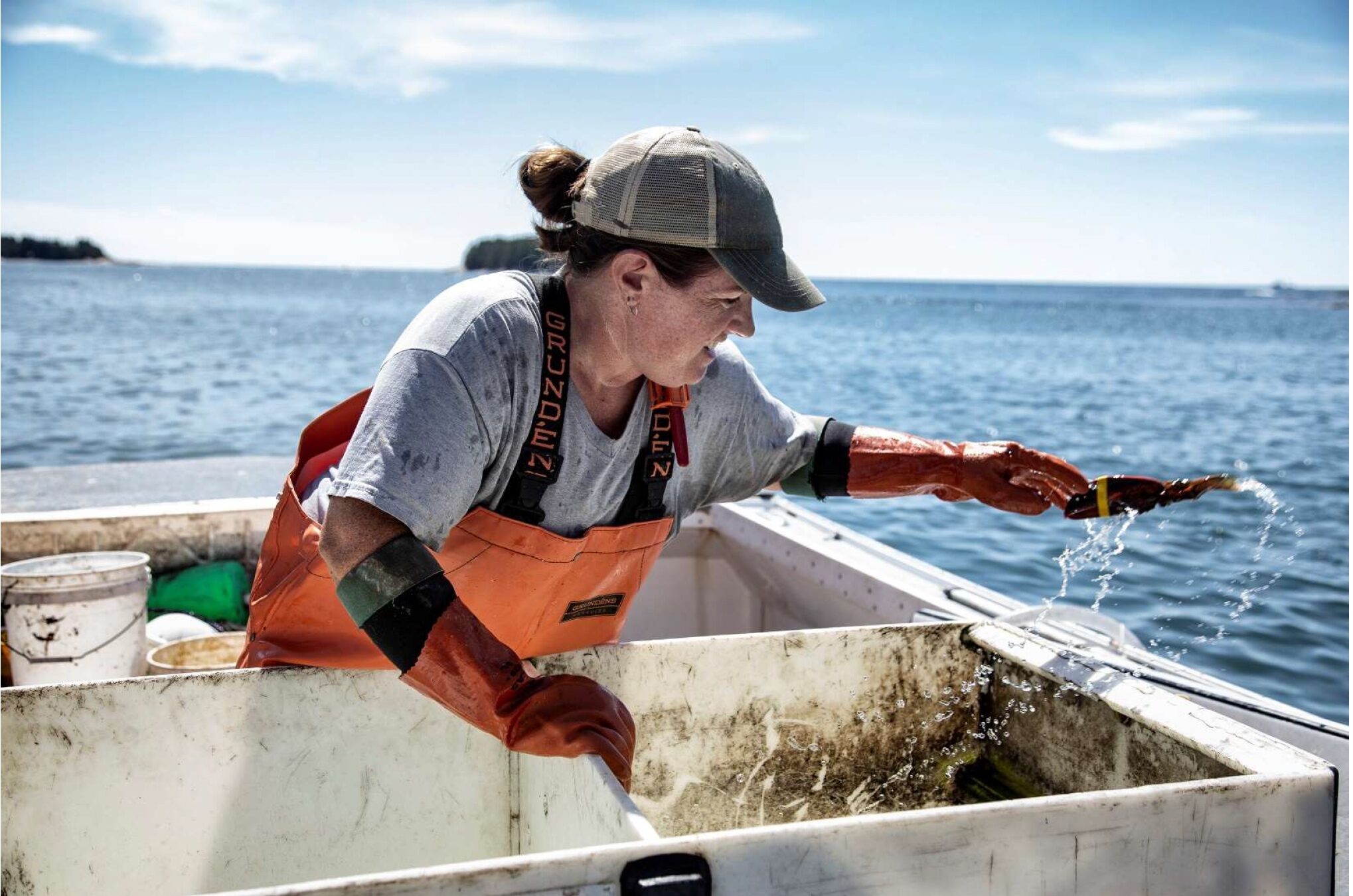
I think Captain Leigh Farnsworth explains it best. She loves having a career as a lobsterman because she’s able to be her own boss. As a mother of two boys, she’s able to schedule her trips out in order to be present for her family. It’s not easy to be a mother on the sea, though. Leigh thinks back to times like when she was out in the rocking waves trying to pump breastmilk and keep it cool until she got home.
“What makes being a mom and a lobsterman difficult is that you are spread so thin, trying to make a living at a very demanding, time-consuming job, and still take time to have fun experiences with the boys. But all the other stuff still has to get done—laundry, cleaning, bills, shopping, dinner, homework, getting the boys to practices and games. Most fishermen come home and their wives have taken care of those details, so they can just concentrate on their job. My husband helps where he can, but he works a full-time job. This is not a complaint, because I love my life and wouldn’t change it, but I’d like people to be aware of the mental load/physical load that a mom in this profession carries.” — Leigh Farnsworth
Talk about some of the other jobs Maine’s female lobstermen have.
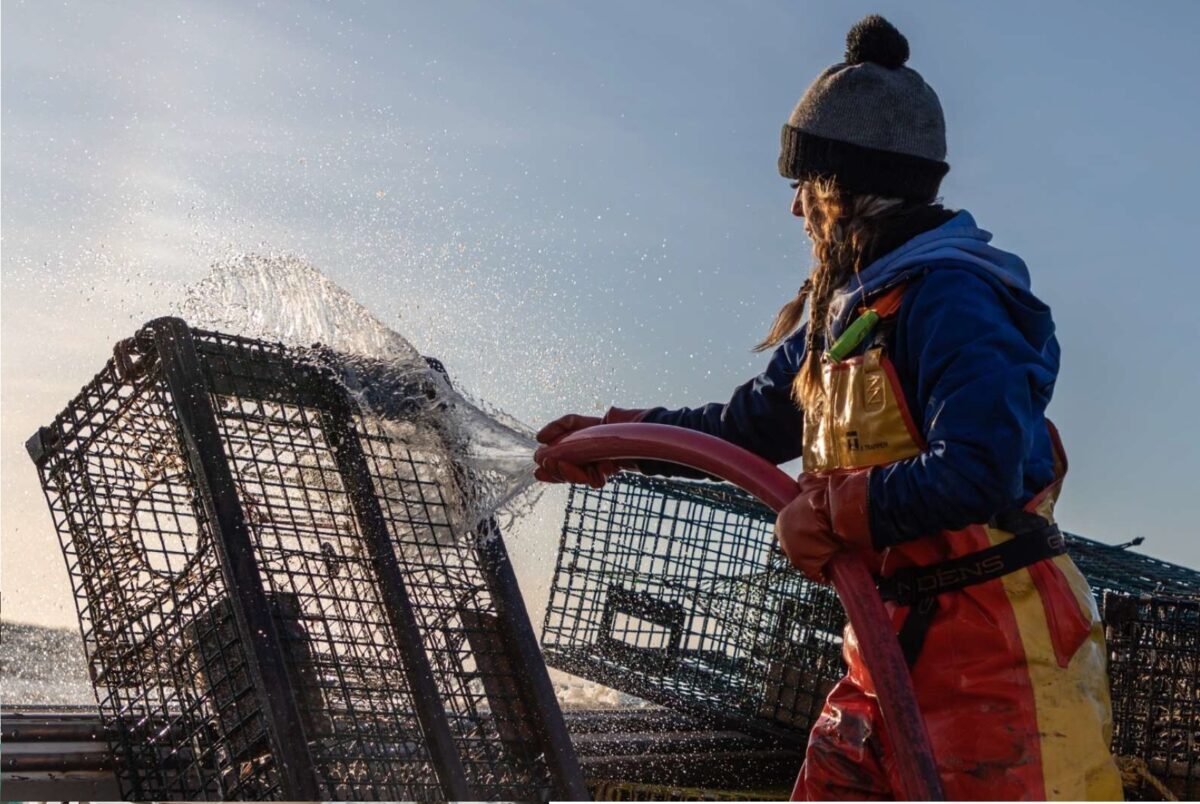
I loved hearing about what the ladies do off the water. Within the book, you’ll see off-season accomplishments such as pilots, attorneys, marine biologists, state representatives, aquaculture farmers, construction workers, wharf management, substitute teacher, property management, sport coaches, marathon/triathlon participants and advisors on numerous councils.
What’s next for you?
I’m very excited for my next project which is about halfway complete. It is a children’s book about a little girl who grows up lobstering with her Dad in Maine. You will see real fishermen from the area portrayed in the book as well as many of the locations and sights we know and love. The book is called A Lobstergirl Can, and we hope to see it completed by this Spring/Summer (2021).
Details
Pretty Rugged: True Stories from Women of the Sea is available through Sea Street Publishing’s Facebook commerce shop. The hardcover coffee-table book is $32.99. Also available is the 2021 Women of the Sea calendar for $19.99. Note: Farrell is donating all proceeds from the calendar to the Maine Lobstermen’s Defense Fund.
Farrell also maintains a Facebook page for the book.
